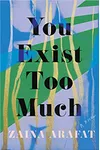Picture a Palestinian-American storyteller weaving tales of identity, love, and belonging with a fearless pen—meet Zaina Arafat! This Brooklyn-based author has captivated readers with her debut novel, You Exist Too Much, a poignant exploration of queerness and cultural displacement that’s as heartfelt as it is bold. With her lyrical prose and unflinching honesty, Arafat is carving out a vital space in contemporary literature.
Born to Palestinian parents, Arafat grew up shuttling between the United States and the Middle East, a life that shaped her unique perspective. Her writing bridges worlds, blending personal and political narratives with a warmth that invites readers in. Let’s dive into her journey, from her roots to her rise as a literary star.
The Making of Zaina Arafat
Zaina Arafat’s story begins in a swirl of cultures, growing up between Washington, D.C., and cities like Bethlehem and Beirut. This constant movement fueled her curiosity about identity and belonging, themes that pulse through her work. Initially drawn to international journalism, she earned an MA in international affairs from Columbia University, reporting from places like Jordan and Palestine for outlets like NPR and The Washington Post. But a memoir class at Gotham Writers Workshop sparked a shift. She discovered a love for creative writing, leading her to an MFA at the University of Iowa, where she honed her craft and found her voice.
Zaina Arafat’s Unforgettable Stories
Arafat’s debut novel, You Exist Too Much (2020), is a tour de force. Following a queer Palestinian-American woman navigating love, shame, and cultural expectations, the story unfolds in vivid vignettes from Bethlehem to Brooklyn. Praised by Roxane Gay as her favorite book of 2020 and winner of a 2021 Lambda Literary Award, it’s a raw, relatable dive into the messiness of self-discovery. Arafat’s prose is both intimate and universal, blending humor with heartache.
Her forthcoming essay collection, Our Arab, promises to delve deeper into her experiences as an LGBTQ Arab-American. Arafat’s essays, published in The New Yorker, The New York Times, and The Atlantic, tackle everything from Ramadan in times of crisis to the nuances of diaspora life. Her style is marked by sharp insights and a conversational tone that makes complex topics feel accessible. Whether fiction or nonfiction, Arafat’s work challenges stereotypes and amplifies marginalized voices.
As an editor, she’s curated powerful portfolios, like a response to the 2017 travel ban for The Margins, showcasing her commitment to uplifting diverse stories. Her ability to weave personal narratives with broader social issues sets her apart as a writer who doesn’t just tell stories—she sparks conversations.
Why Zaina Arafat Matters
Zaina Arafat’s impact lies in her fearless exploration of identity. As a queer, Palestinian-American woman, she writes from the margins, offering a lens on experiences often overlooked in mainstream literature. Her work resonates with readers who see themselves in her characters’ struggles and triumphs, from navigating cultural expectations to embracing their truths. By teaching at Barnard College, The School of the New York Times, and international workshops in Jordan and Egypt, she empowers aspiring writers, especially those from marginalized communities, to tell their own stories.
Her advocacy extends beyond the page. Through the Writer’s Guild Initiative, she’s led workshops for DACA recipients and Dreamers, fostering creativity and resilience. Arafat’s voice is a beacon for inclusivity, making her a champion for both immigrant and LGBTQ communities, as recognized by awards like the Arab Women/Migrants from the Middle East fellowship and The Advocate’s Champion of Pride honor.
- Born: Palestinian-American, raised between the U.S. and Middle East
- Key Work: You Exist Too Much (2020)
- Awards: 2021 Lambda Literary Award, Arab Women/Migrants fellowship
- Upcoming: Our Arab essay collection
Snag You Exist Too Much and dive into Zaina Arafat’s vibrant, soul-stirring world! Her stories are a reminder that every voice matters—especially the ones that dare to exist too much.
